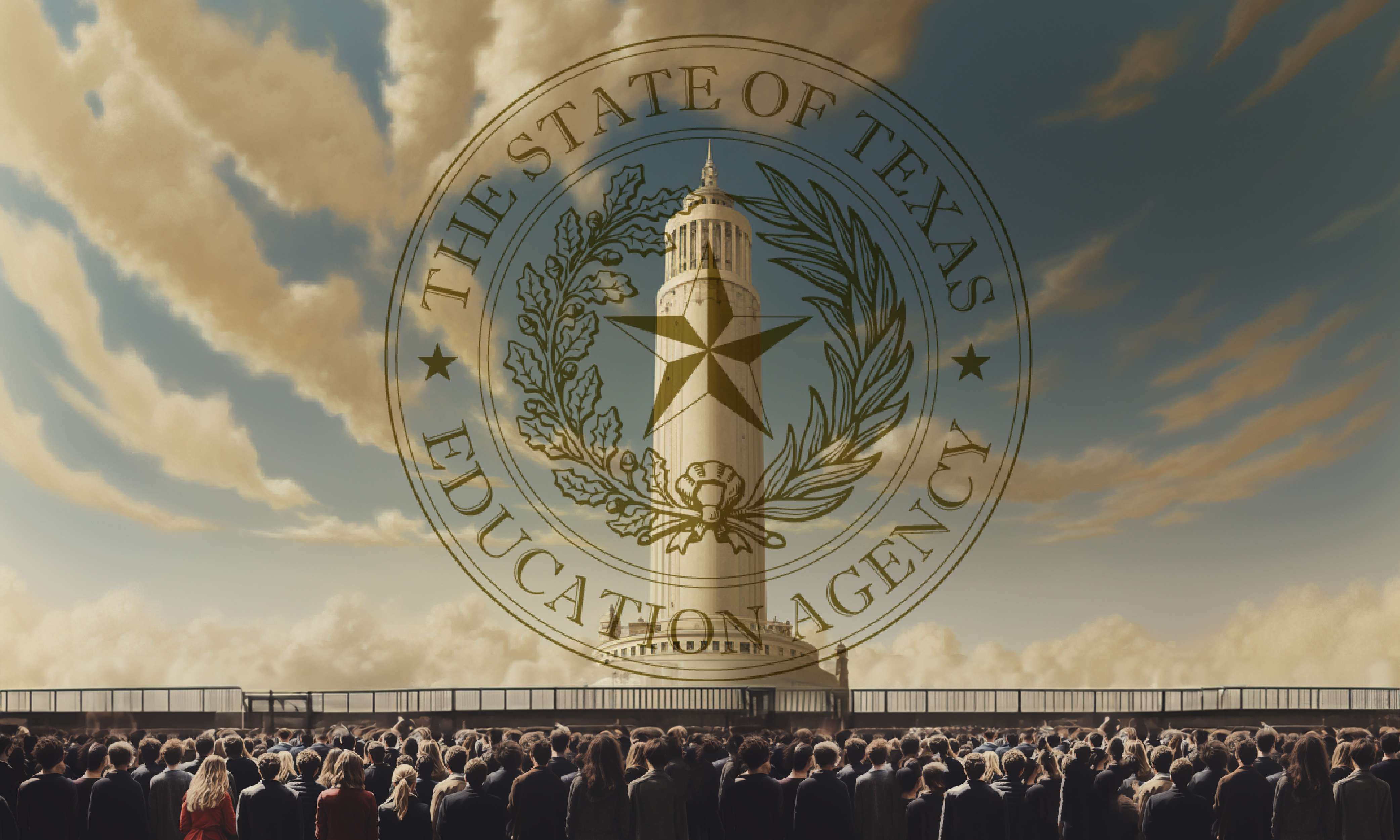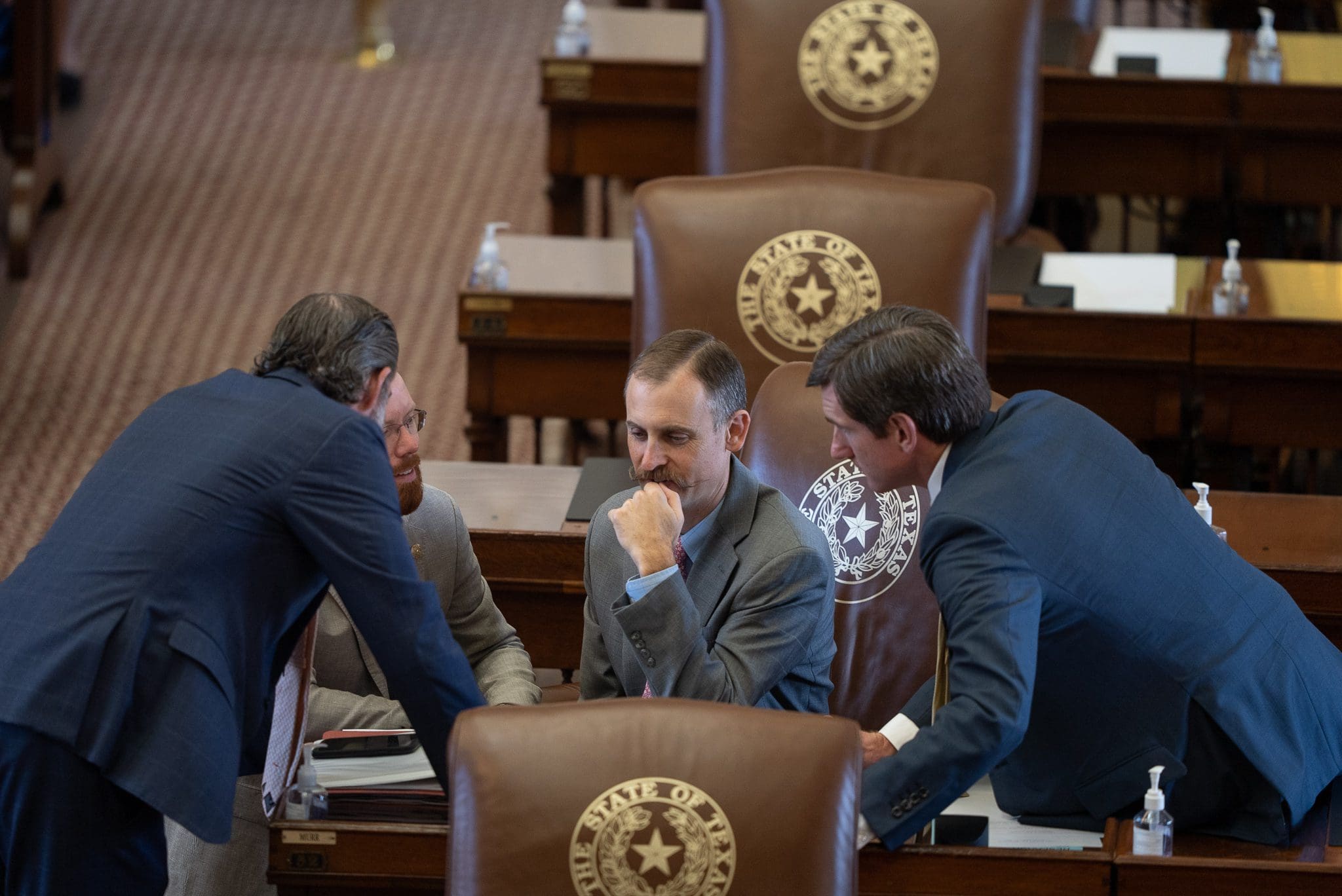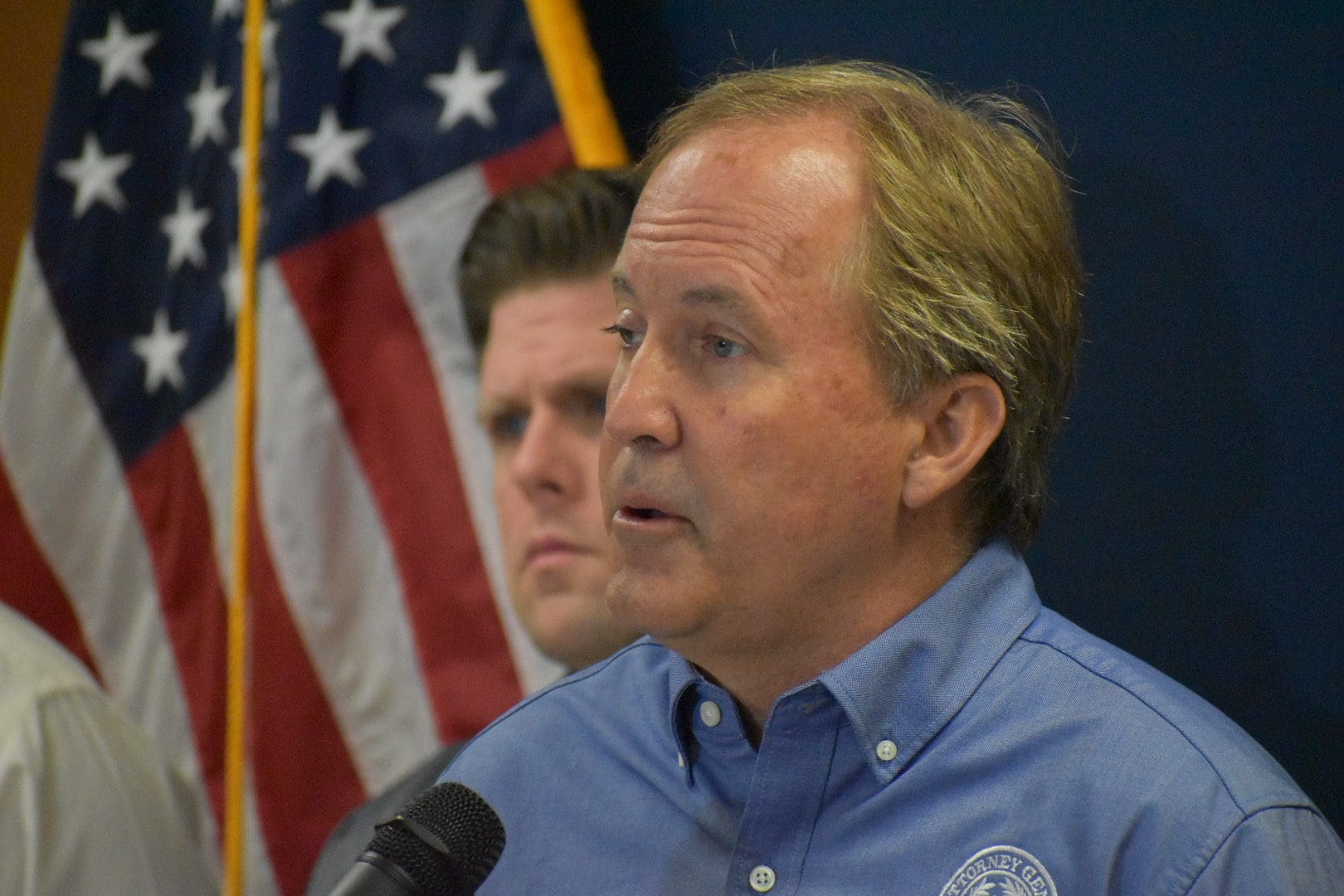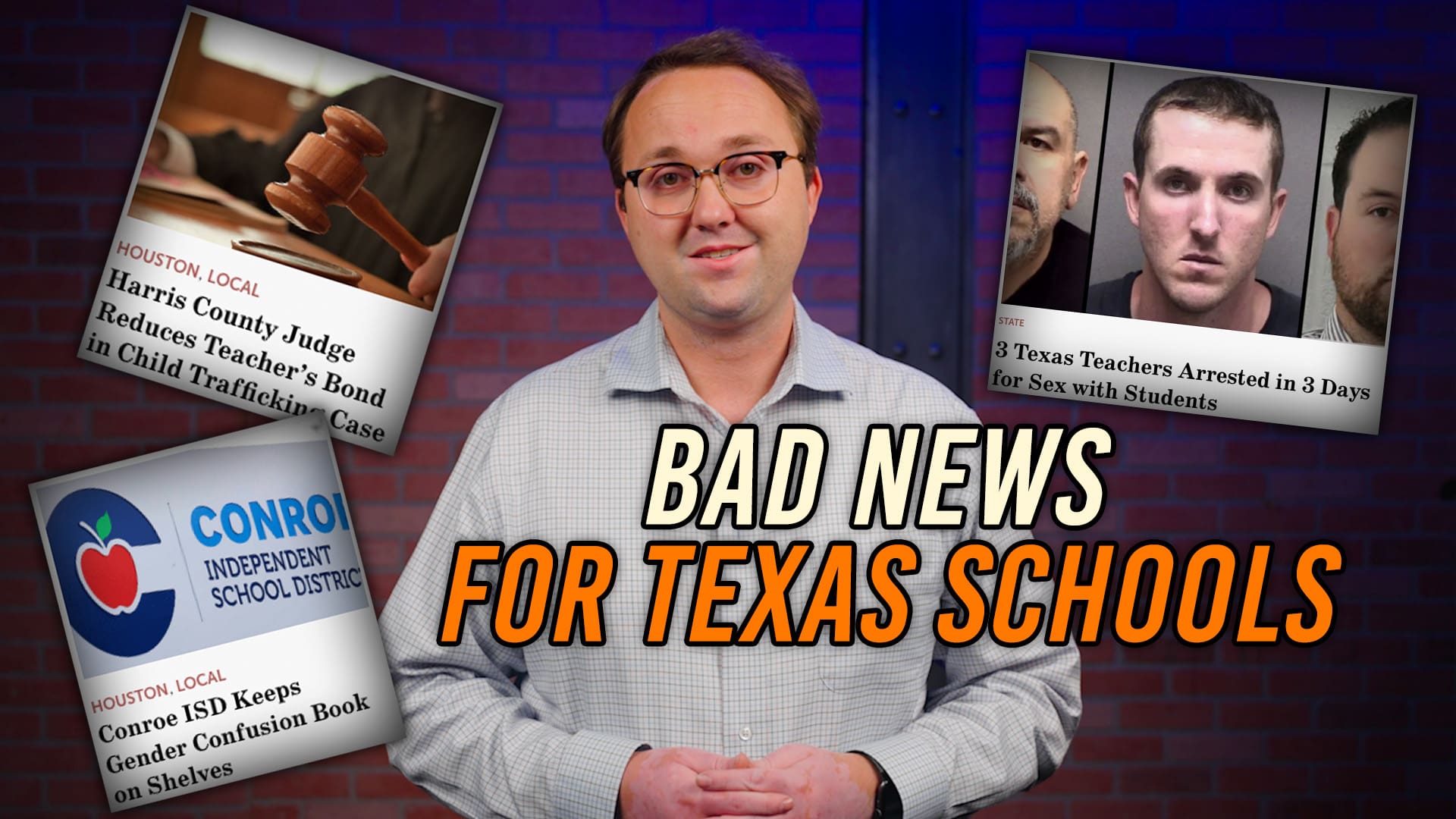EDITOR’S NOTE: “A previous version of this article misidentified San Antonio ISD. It has been updated.”
When children are abused in Texas government schools, it’s almost impossible to for victims and their families to get justice. Comparatively, parents can more easily hold private schools accountable for similar failures.
Insulation from accountability contributes to the state’s government schools being a hostile learning environment for students.
Multiple attorneys Texas Scorecard interviewed repeatedly pointed out the accountability gap between government and private education. “[Government school districts] definitely enjoy a lot more protections,” said Hal Browne, a Dallas attorney who represents sexual assault victims.
While there is a path to hold government schools accountable in federal courts, it is extremely difficult to succeed and reportedly becoming more so. This leaves grieving families and victims few avenues for justice when the government school they trusted fails to protect their children.
Backstory
In January 2022, the Boston Globe launched an expansive expose of how a corrupt system within the Roman Catholic Church allowed predators to abuse multiple children without accountability. Their investigation also highlighted how lawsuits were an important part of holding the system accountable.
In this investigative series, Texas Scorecard has examined how a similar corrupt system appears to be present in Texas’ government schools. Part one cited multiple lawsuits and interviews from across the state dealing with cases from nearly 20 years ago to the present. These cases revealed patterns of predators operating in these schools, where school employees either ignored red flags or engaged in a cover-up.
Part two referenced multiple documents warning of the growing problem of predators in government schools, including Texas. Previous reporting also covered a claim that state law is not being enforced, and a state agency in the system’s chain of defense has failed to protect children in its charge.
This article will cover the accountability gap that exists between government schools and private schools, and how it affects the families of victims who seek to hold the former accountable for failing to protect their children.
Losses
“I won’t do these cases anymore,” said Attorney Ricardo Garcia in McAllen, Texas. Not all cases he’s taken to hold government schools accountable for Educator Sexual Misconduct have succeeded.
Such is the case with the tragic and horrific story of Adrian Salazar, the 28-year-old salesman out of San Antonio. He was allegedly groomed and sexually abused at Price Elementary’s then Vice-Principal Michael Alcoser. This was covered in part one of this series.
Garcia represented Salazar in his lawsuit to hold the South San Antonio Independent School District accountable in federal court under Title IX of the federal Education Amendments of 1972. “Title IX protects people from discrimination based on sex in education programs or activities that receive federal financial assistance,” states the U.S. Department of Education.
Dr. Charol Shakeshaft, a specialist in the study of ESM, discussed Title IX in her 2004 white paper. “The primary federal legal remedy for sexual misconduct in schools is Title IX of the Education Amendments of 1972. The language of Title IX doesn’t mention sexual harassment but, rather, is a statute that prohibits discrimination on the basis of sex in any educational organization that receives federal funds,” she wrote. “Title IX provides for federal enforcement of the prohibition on sexual discrimination and the possibility of loss of federal funds for any educational institution in violation of Title IX or its regulations.”
“If you look at Title IX, in the sections that we alleged that were violated, it [states] sexual assault from adults on a minor, that is a form of discrimination,” Attorney Garcia explained. He further described how Title IX can be used to hold government schools accountable in such a situation. “What you have to prove is—I think the term is called the ‘appropriate person as designated by the school district’—that they have actual knowledge of what’s going on. The appropriate person typically is the principal on this campus. We were able to show that obviously … the principal did set aside [the matter], didn’t pursue it.”
According to The Henry Law Firm, “Actual knowledge differs from constructive knowledge in that a person ‘has to have known’ instead of ‘should have’ known about an event or condition. Actual knowledge can be proven by direct or circumstantial evidence.”
Hal Browne, a Dallas attorney who represents sexual assault victims, concurred with Garcia’s explanation. “You have to show that the funding recipient … the school district was deliberately indifferent to the sexual harassment or assault. Then you have to show that they were had actual knowledge of the fact that it happened,” he told Texas Scorecard. “The third prong is that the harassment or assault is so severe, pervasive, and objectively offensive that it can be said to deprive the victims of access to educational opportunities or benefits.”
Attorney Andrew Christman also discussed how Title IX applies to these cases. “Because the states receive federal funds for education, Title IX applies to them, and there is a mechanism by which to hold school officials accountable, because they receive federal funds through Title IX and through other federal legislation,” he said. “To me, that is an adequate remedy.” In February 2014, he represented Dennis and Linda Mason in their quest to hold Denton ISD accountable. This was the case where Mason’s daughter, “Jane Doe,” alleged she was groomed and preyed upon by former Denton ISD choir director Michael Pricer. After multiple alleged sexual encounters with Pricer, it was discovered that the young girl had been infected with the sexually transmitted disease HPV. This was covered in part one of this series.
Garcia said he initially won a $5 million judgment against the school for Adrian.
But the story didn’t end there. Garcia said the decision was appealed to the Fifth Circuit Court of Appeals, which reversed the judgment and sided with the school district. “The fact that the principal was doing it wasn’t enough to put in place actual knowledge on the part of the school district. We had to show that it was someone above him [that] would have had to have known, such as the superintendent,” Garcia said.
Adrian said his lawyers appealed that decision, but the U.S. Supreme Court did not take it up. He still believes the school district should have faced accountability for their vice-principal’s abuse of him. He recalled how a couple of elementary teachers walked in on him sitting on Alcoser’s desk. “They suspected something as well, but all of them said the same thing: They all feared retaliation, which is why they never went above him … their fear was jumping straight over him, too, skipping the chain of command. It’s like corporate suicide. From my understanding, that’s the reason they didn’t say anything,” he said. “That’s why I feel like the school should be held accountable, because of his position of power. He was able to do this for so long.”
Garcia agrees. “I think that if the appropriate person, the man in charge, is the one doing the evil act—the molestation—then that should have been an exception accepted by the Fifth Circuit. We shouldn’t have to go above that. It’s almost an impossible standard.”
Garcia expressed his frustration at the difficulty of holding school districts accountable in federal court. “I won’t do these cases anymore, because that standard is just, you can’t reach it,” he said. “Nine out of 10 times, you’re not gonna be able to get there.”

Lori Watson, a Dallas area attorney who works with Hal Browne in representing sexual abuse victims, has experienced similar struggles. “Every single case that I had, that’s been [a] public school district case, I think has been dismissed out from under me. Either at a trial where they did a directed verdict motion, or a 12(b)(6) [motion to dismiss] or something,” she said. “It’s beyond an uphill battle.”
Browne added to Watson’s comment. “It just seems our experience has been that the courts tend to favor the interest of the institution, whether it be public school, or any type of institution.”
Browne and Watson believe accountability for government schools in federal courts may get even harder. Their reasoning is an October 2021 U.S. Supreme Court decision (Cummings v. Premier Rehab Keller, P.L.L.C.). “That case specifically dealt with the rehabilitation statute in the Affordable Care Act,” Browne said. “That found that because … that statute is drafted under what’s called the Spending Clause of the Constitution, then only the only damages that a plaintiff can recover in those type of cases are cases that would ordinarily be recoverable in a breach of contract case.”
While the Cummings decision did not specifically reference Title IX, Browne told Texas Scorecard that Title IX is at risk because it too is under the Spending Clause of the U.S. Constitution. He explained why he believes the Cummings decision would directly threaten one of the few ways victims can hold government schools accountable: “Some courts are now interpreting Cummings to say that no, in a Title IX case … you can’t recover for the fact that you’ve had shame, humiliation, that you’re suffering from depression, you have trust issues, all the things that go along with being sexually assaulted in a school… Traditionally, mental and emotional damages, are not recoverable under contract disputes.”
This is key because the victims in these situations are children. Watson said they don’t usually suffer a “loss of earning capacity” or anything similar. “The bulk of your claim, lots of times, come down to emotional harm damages, which also ties to if you had an expert testifying to future counseling that’s needed and everything else.”
“What a lot of defense counselors are doing is saying, ‘Well, even though it’s future costs or counseling, that’s really all based on emotional harm, right? So that’s out the window, too,’” she continued. “They’re gutting the damages of your case, even though they’re saying, ‘Oh, you can still bring your case. You can’t collect any damages for it.’”
Watson did say this doesn’t eliminate the Title IX route of accountability entirely. “It just puts another super hard element on top of it.”
“Unfortunately, it’s kind of putting a kind of a chilling effect on people even taking these cases,” Browne added.
Victories
There were some victims of sexual abuse Texas Scorecard covered in part one that were successful in holding government school districts accountable.
Dennis and Linda Mason sued the school district for failing to protect their daughter after allegedly ignoring multiple red flags that clearly indicated Pricer was a predator. Their lawsuit also alleged the district did not conduct a thorough investigation into Pricer after allegations surfaced, and did not inform the Masons when Pricer was spotted at the Mason’s home.
Denton ISD and co-defendants Wilson and Fisher offered a settlement of $150,000. The Masons accepted it. While the document noting the amount and agreement is titled “Final Judgment,” in effect it is a settlement.
“This is a court document stating that neither party was found to be at fault. It’s very common for an insurance company to assess that a claim be paid in settlement in lieu of paying the cost of going to trial.” Julie Zwahr, the Denton ISD’s Chief Communications Officer told Texas Scorecard.
Christman believed the family deserved more compensation for the pain they endured. “It should have been a very different number.” He said the only reason why they didn’t go for more was because of the toll it would have taken on the already taxed Mason family. “This would have been a spectacle, and the family couldn’t do it … It was heartbreaking.”
Zwahr claimed that “Denton ISD takes the responsibility of selecting and hiring individuals who work with our students very seriously. We conduct rigorous and meaningful interviews, thorough reference checks, background checks and provide effective staff development training for all employees.”
Attorney Ricardo Garcia successfully helped another family hold a government school accountable for allegedly failing to protect their child: Harlingen CISD in far south Texas . This was the case where 42-year-old assistant coach and science teacher Robert Amitrani allegedly “repeatedly sexually assaulted” a 15-year-old girl. Again, the family sought to hold the government school accountable because of their failure to protect their daughter, and repeatedly ignoring red flags surrounding their own employee. In February 2017, both parties filed for a dismissal, informing the judge they had settled the matter.
Texas Scorecard asked current Harlingen CISD Board President Dr. Belinda Reininger, and interim Superintendent Dr. Veronica Kortan, what systems they have put in place to prevent another Amitrani situation. “The District has in place policies and procedures for investigating claims of sexual assault, harassment, discrimination and retaliation when complaints are brought forward to our District,” replied Assistant Superintendent Debbie Scogan. “The District emphatically denies the allegations that you make that the District took no action or acted incorrectly in the situation. The District follows a thorough vetting of our candidates and ensures the safety and wellbeing of our students.”
Narrow Accountability
It’s easier to hold private schools accountable in court than it is for government schools. That’s according to attorney Lori Watson. “It’s a much easier standard. It’s a standard of negligence versus a standard of deliberate indifference.” Browne added that if a private school receives federal taxpayer funding, then victims can opt for the same Title IX higher standard as a government school. “It’s much easier to bring a case against a private institution within the state of Texas, because the threshold’s not as high,” he said. “You can bring in a negligence case saying that they failed to act as a reasonably prudent educational institution would have under the same or similar circumstances, versus the deliberate indifference.”
This contradicts the claims of pro-government school enthusiasts who regularly announce that government schools are easier to hold accountable than private schools. Regarding the Mason case against the district, Denton ISD Chief Communications Officer Julie Zwahr wrote the following: “Under Texas law, private schools are not governed by the same policies and SBEC reporting requirements [emphasis original].” Zwahr said that the former choir director, Michael Pricer, who was accused of preying on Mason’s daughter was “subsequently hired by a private school.”
Government schools also appear to be shielded from accountability in state courts. “Title IX was the best vehicle because we don’t have a statute in Texas that allows us to sue a school district for molestation and recover money damages,” Garcia said.
Education attorney Janelle Davis of Collin County agrees. “In Texas, the way the law is, it is extremely hard to sue school districts for just about anything,” she told Texas Scorecard. “There’s very little accountability or oversight with the legal system.”
Hal Browne agreed. “The immunity statute here basically protects school districts from state claims.”
Such lack of accountability spreads outside the state courts to the Texas Education Agency as well. “There’s very little accountability oversight when it comes to the TEA. They will tell you they have very limited authority to hear matters involving or complaints involving school districts,” Davis said. “You have to fit it within certain sections of the education code. For most grievances, for the parents that call me, it’s hard to find a section of the education code that you can argue applies. Even when you do, the TEA, in my experience for the last few months, just bend over backwards to try to not hear those complaints on their merits.”

Texas Scorecard asked TEA for comment on Davis’ statement and what they are doing to make schools safe again. They did not reply before publication.
Christman disagrees with arguments about how immunity protects bad school districts. “Whether it’s state or federal is really not a factor when it comes to the strength of an immunity claim,” he said. “I haven’t seen an immunity defense really being an obstacle to a successful case against a guilty school official who’s committed a crime like this, or a school system that has perpetrated a system that is facilitating predators like [the Denton ISD case].” He explained how he believes state law often mirrors federal law. “Texas is one of those states where a lot of federal laws, especially Title Seven … the Civil Rights Act of 1964, … all those things are prohibited under state law, just like federal law.”
Christman prefers taking ESM-type cases to federal courts. “There are remedies available under federal legislation. Sometimes it’s best to get around the state for that reason, which is why I like federal court. I like federal law. You’re not going to be stuck with politicians blockading your ability to protect the people that should be protected.”
The Need for Accountability
Davis said the accountability gap for government schools has created a fallout that’s harming and discouraging Texas families. “I’ve talked to parents across the state who have children that have been harmed in their school district,” she said. “The facts are always a little bit different, about how it happened and what happened and who did it. But what is always common is the parents cannot believe that there is no accountability. They cannot believe that there’s no acknowledgement that anything has happened. They cannot believe that they’re ignored, they’re minimized, they’re dismissed.”
Davis said for parents who have been through such horrors, the only way to win back trust was through accountability, admitting fault, and “explicit action steps” so history isn’t repeated. “Unfortunately, most Texas school districts just don’t seem interested in doing that. I don’t know If it’s just because they have just kind of been operating for so long without a lot of questions from parents, or if it’s because they know they can’t be sued.”
Brady Gray, president of Texas Family Project, said in order to win back trust, government school boards and staff must commit to communicating with communities. “It takes leadership in those institutions, that’s willing to take [a] bold stance, and say to their community and say to their students ‘we’re not going to tolerate this stuff.’”
Dr. Charol Shakeshaft agreed community involvement is key in increasing accountability. “I think schools need to confront [ESM] directly, and confront it with parents, and confront it with kids. What I find is that we don’t really speak about it openly very much, and we don’t train,” she told Texas Scorecard. She recommended schools empowering parents with tips on possible red flags that could indicate inappropriate behavior from a school employee towards a child, and possible indicators in a child’s behavior that could indicate he or she is a victim. She also recommended training children, encouraging that red flags be reported, and be allowed to be reported anonymously.
But what of the accountability gap in the courts? Attorney Browne said he’s read there are discussions in the U.S. Congress to try and address the Cummings ruling. However, he and others believe that does not mean state lawmakers should sit idly by and wait for the federal government to sort this problem out.
“They could pass limited bills with respect to a waiver of immunity,” Browne said. “They can put into a statute saying, in a situation like this, we grant a limited waiver of immunity where it’s clear that a school district—or entity like that—has clearly engaged in a cover-up, or did not do the things necessary to ensure that this type stuff [would not have] happened, or did not notify so that parents could have the choice to protect their kids from known perpetrators.”
Ricardo Garcia had similar recommendations for state lawmakers. “I wish the legislature would enact laws that place civil liability on the part of school districts should they have this, not say ‘actual knowledge,’ but knowledge that the boy or the child is being molested, and that knowledge on the part of the school district is that they knew more probably than not that this molestation is occurring,” he told Texas Scorecard. He also said there must be a “reasonable investigation,” but it shouldn’t be the school district that does it because they could sweep the problem under the rug. “If you’re going to place the responsibility of self-policing, self-regulating on the part of the school district, they can whitewash what’s going on,” he said. “Maybe the standard now … should be that if they have evidence of this occurring, they’re under an obligation to report this to the police, and the police can initiate an investigation. And if they don’t, they try and cover up, [then] they’re liable for civil suits.”
Dr. Shakeshaft believes civil lawsuits against school districts can help hold them accountable, but notes they often result in insurance companies paying settlements rather than coming directly from school budgets. She thinks if schools were required to pay settlements directly out of their budget, it might bring enough pain to force them to reform. “It seems to me that that would at least bring home the point that that there’s a consequence here to not being accountable, to not supervising, to not listening, to not teaching,” she told Texas Scorecard. “What school district wants to use up its budget paying off a plaintiff for the harm that’s come to them when they could be using it for educational purposes?” Shakeshaft also advised it would be more effective if civil lawsuit settlements required schools to undergo training and reform practice. Overall, she thinks lawsuits can help but stronger accountability measures are still needed.
Texas Scorecard asked Tim Hardin, President of Texans for Fiscal Responsibility, if the education system would be forced to clean itself up if families of victims could sue government schools. “If something happened to my child in a public school, then yes, I would want the ability to sue for damages. But I think a better strategy is prevention, right? And we get this by a change in policy,” he relied. Hardin added this involves passing policies that change the environment in government schools where predators cannot function. However, he did express concern about civil lawsuits. “There’s so many bad actors, and there’s so many horrible things happening in public education, I think if lawyers are involved, we could bankrupt the entire system.”
Texas Scorecard contacted the chairs of the state’s education committees—State Rep. Brad Buckley (R–Salado) and State Sen. Brandon Creighton (R–Conroe)—about the problem of predators in government schools and the accountability gap. They did not reply before publication.
Gov. Greg Abbott is expected to add school choice to an upcoming special session. Texas Scorecard asked if he would add making government schools safe again to a special session agenda. No response was received before publication.
Browne and Watson are also working on trying to eliminate the statute of limitations for child sexual abuse in civil cases. “Our experience has been sometimes people [aren’t] able to deal with the issue until well later in life—I mean, their 40s, 50s, 60s—because it’s such a horrendous experience to go through,” Browne said. “There definitely needs to be some changes to the law in a number of regards.”
Where Is The Texas House?
Committees are a part of the process law-making bodies use to propose and pass new laws or conduct other business. A unique committee in the Texas House is the General Investigating Committee.
The House Rules state this committee may hold “inquiries and hearings concerning” state and local governments or agencies, and the spending of taxpayer monies by any state or local government. They may also investigate “any other matter the committee considers necessary for the information of the legislature or for the welfare and protection of state citizens [emphasis added].”
The Rules also state that committees may meet whether the legislature is in session or not.
Speaker of the House Dade Phelan (R-Beaumont) assigned State Rep. Andrew Murr (R–Junction) to chair the General Investigating Committee. During the 2023 legislative session, both he and Phelan demonstrated how quickly this committee can move.

Sitting: State Rep. Andrew Murr.
During the heavily criticized impeachment of Republican Attorney Gen. Ken Paxton, Murr and the committee, with Phelan’s approval, engaged in what critics called a rushed and opaque process. Up until the end of the session, almost no one was aware the House General Investigating Committee had been investigating Paxton.
This year, the committee did appear to demonstrate concern regarding those in a position of power preying on the youth. They quickly jumped into investigating former State Rep. Bryan Slaton (R–Royse City) after allegations surfaced he had an inappropriate relationship with a young staffer. Despite Slaton resigning, the committee successfully brought a resolution to the full House to expel Slaton from the body for “predatory behavior.” It passed unanimously.
Sexual predators in government schools continue to fill news headlines. As of publication, there is no word on whether or not the General Investigating Committee is examining this threat to Texans’ children.
Texas Scorecard asked Brady Gray, President of Texas Family Project, if this is an issue the committee should investigate. He said that if it is not happening at the local level, then the state should step in, and if the House General Investigating Committee is responsible for it then they should take it up. Historically, and in 2023 the GI committee has been used primarily to run attacks on the political adversaries of the Texas House leadership. “Investigating rampant sexual abuse in Texas government schools and proposing solutions that can help bring closure and act as a deterrent would be a worthwhile use of the committee’s resources and power.”
Texas Scorecard contacted Chairman Murr and asked if the committee will investigate this matter, and seek to hold the government education system accountable. We also asked if Murr would be available for an interview on the subject. No response was received before publication.
What does it say if the Republican-controlled General Investigating Committee, and the Republican-controlled House, do not investigate the infestation of predators in government schools?
Source Documents
For this article, Texas Scorecard reviewed or referenced multiple court case complaints. In each of these cases, either the parent or the victim uses the pseudonym of “John” or “Jane Doe.”
- John Doe v. Harlingen Consolidated Independent School District (Filed March 2016)
- Jane Doe, and Dennis and Linda Mason v. Denton Independent School District, Jamie Wilson, Barbara Fischer, and Michael Pricer (Filed March 2013)
Texas Scorecard also reviewed or referenced settlements and/or dismissals.
- Final Judgement for the Doe and Mason v. Denton Independent School District, Jamie Wilson, and Barbara Fischer complaint (Filed February 2014).
- Stipulation of Dismissal in the John Doe v. Harlingen Consolidated Independent School District (Filed February 2017).
- Cummings v. Premier Rehab Keller, P.L.L.C. (October 2021)
We also reviewed the following white paper published by the U.S. Department of Education: Educator Sexual Misconduct: A Synthesis of Existing Literature, by Charol Shakeshaft (2004).
Citizens wishing to conduct a deep dive should click the links above.
In Part Four, Texas Scorecard will examine how grooming became institutionalized in the state’s government school system, making children more vulnerable.
No ads. No paywalls. No government grants. No corporate masters.
Just real news for real Texans.
Support Texas Scorecard to keep it that way!





